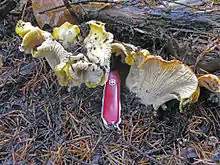Cantharellus cascadensis
Cantharellus cascadensis, or the Cascade Chanterelle is a fungus native to the Pacific Northwest region of North America. It is a member of the genus Cantharellus along with other popular edible chanterelles. It is named after the Cascade Range, where it was formally described in 2003.[1]
| Cantharellus cascadensis | |
|---|---|
 | |
| Scientific classification | |
| Kingdom: | |
| Phylum: | |
| Class: | |
| Order: | |
| Family: | |
| Genus: | |
| Species: | C. cascadensis |
| Binomial name | |
| Cantharellus cascadensis Dunham, O'Dell & R. Molina 2003[1] | |
| Cantharellus cascadensis | |
|---|---|
float | |
| ridges on hymenium | |
| cap is infundibuliform | |
| hymenium is decurrent | |
| stipe is bare | |
| spore print is white | |
| ecology is mycorrhizal | |
| edibility: choice | |
Similar species
Several other species of chanterelle may be found in western North America:
Additionally, Hygrophoropsis aurantiaca, Chroogomphus tomentosus, and species in the genera Craterellus, Gomphus, Omphalotus, and Polyozellus may have a somewhat similar appearance to C. cascadensis.
References
- Dunham, Susie M.; O'dell, Thomas E.; Molina, Randy (October 2003). "Analysis of nrDNA sequences and microsatellite allele frequencies reveals a cryptic chanterelle species Cantharellus cascadensis sp. nov. from the American Pacific Northwest". Mycological Research. 107 (10): 1163–77. doi:10.1017/S0953756203008475. PMID 14635765.
External links
- Cantharellus cascadensis in Index Fungorum
- David Pilz; Lorelei Norvell; Eric Danell; Randy Molina (2003). "Key to Pacific Northwest CHANTERELLES, Chanterelle-Like Mushrooms, and Look-Alikes". Pacific Northwest Key Council. Retrieved 2011-03-22.
This article is issued from Wikipedia. The text is licensed under Creative Commons - Attribution - Sharealike. Additional terms may apply for the media files.